Italy is one of those countries that you immediately fall in love with the minute you walk off the plane, with its rich history, architecture that will leave you gaping in amazement, and some of the most delicious food you will ever eat. However, as a tourist, it is important to come prepared with some knowledge about the country’s local customs and traditions if you want to avoid looking like a fool, or worse still, ill-mannered.
In this post, we will explore ten different things you should avoid doing as a tourist in Italy in order to ensure that your long-awaited trip goes off without a hitch. From knowing exactly when to drink a cappuccino to steering clear of common scams, these tips will help you make the very most of your time abroad.
L’Italia è uno di quei paesi di cui ti innamori nell’istante in cui scendi dall’aereo grazie alla sua storia ricca e complessa, la sua architettura incantevole, che facilmente lascia a bocca aperta, e grazie a una cucina che offre tra i migliori piatti che tu abbia mai mangiato. Tuttavia, come turista, è importante arrivare preparati. Per evitare di sembrare un pazzo o, ancora peggio, maleducato è meglio avere una certa conoscenza delle usanze e delle tradizioni locali del paese.
In questo post, scopriremo dieci cose che dovresti evitare di fare in Italia quando sei un turista, questo farà in modo che il tuo viaggio, tanto atteso, si svolga senza intoppi. Dal sapere esattamente quando bere un cappuccino allo stare alla larga dalle truffe, questi suggerimenti ti aiuteranno a sfruttare al massimo il tuo tempo all’estero.
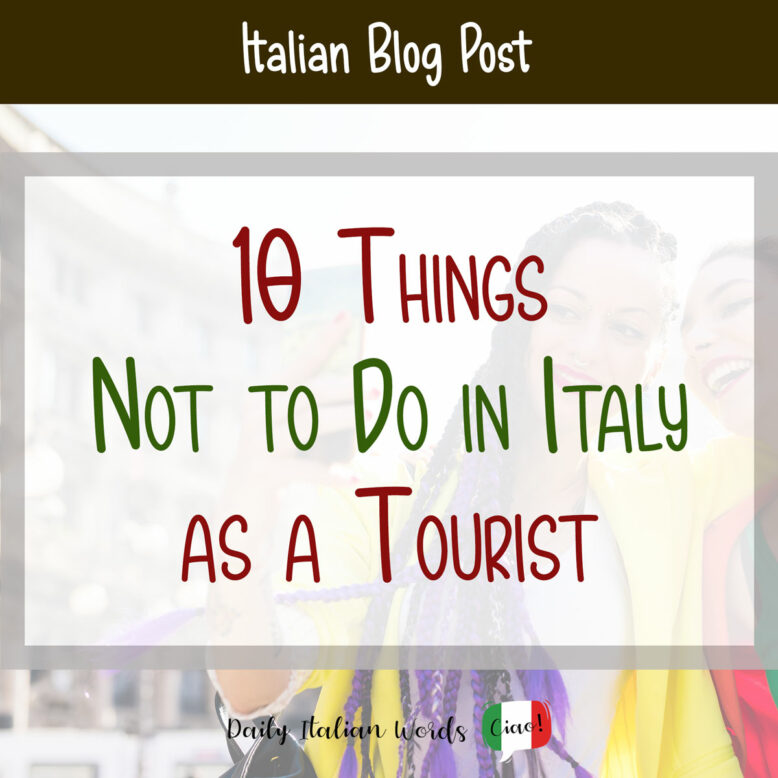
This article is part of our Bilingual Blog series, where we share useful information and tips about non-language related aspects of Italian culture such as food, music, travel and more. These articles have been written in Italian and English to give our readers the opportunity to improve their reading skills whilst learning something new about Italy.
1. Don’t go out without cash
Non uscire senza contante
Paying with the POS system and using cards in shops or cafes is a controversial issue. The upper limit for telematic payments keeps changing, sometimes making it difficult even for merchants to understand how to behave.
Il pagamento con il POS e l’utilizzo di carte per pagare nei negozi o nei bar è una questione controversa. Il tetto per i pagamenti telematici continua a cambiare, risultando difficile talvolta anche per i commercianti comprendere come comportarsi.
It was in the news recently that the commercial activities could refuse card payments under 60 euros. Therefore, not carrying cash could prevent access to events or even the purchase of food and drinks.
È notizia recente che sotto i 60 euro, l’attività commerciale potrebbe rifiutare i pagamenti con carta. Ecco quindi che non portare con sé del contante potrebbe precludere l’accesso ad eventi o perfino l’acquisto di cibo e bevande.
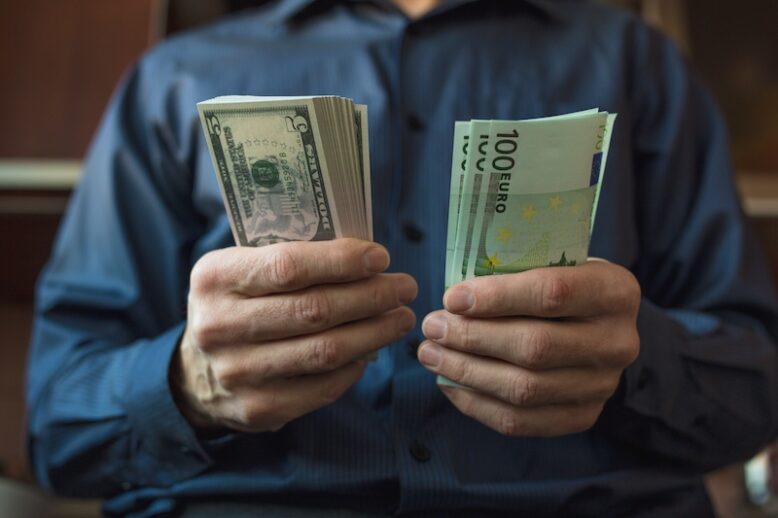
2. Don’t desecrate Italian cuisine
Non dissacrare la cucina italiana
It is no secret that Italian cuisine generally appears in a modified form abroad, often with unorthodox additions or modifications. Some dishes do not even exist in the Italian tradition.
Non è un segreto che la cucina italiana è in genere conosciuta all’estero in maniera revisionata, con aggiunte o modifiche talvolta poco ortodosse e con piatti che a volte neanche esistono nella tradizione italiana.
Remember that ketchup is not tomato puree. Italians only use it for sandwiches or french fries, usually in fast food restaurants. And although you may be used to putting it everywhere, in Italy ketchup is banned from pizza, fish, pasta or any other traditional dish.
Ricorda infatti che il ketchup non è una passata di pomodoro. Gli italiani lo usano solo per i panini o le patatine fritte, in genere nei fast food. E sebbene tu possa essere abituato a metterlo ovunque, in Italia il ketchup è bandito da pizza, pesce, pasta e qualsiasi altro piatto della tradizione.
Don’t add parmesan to fish and above all, choose your restaurants carefully. The best fish cuisines are near the sea. And if you visit mountain resorts, don’t order plain pasta or pizza. In the mountains dishes based on venison ragù, wild boar and other game are typical. Accompanied by local polenta, fresh melted cheese and local mushrooms, they will give you a taste of the Italian mountain tradition.
Non aggiungere il parmigiano sul pesce e soprattutto, scegli bene i ristoranti. Le migliori cucine di pesce sono nei pressi del mare. E se visiti località di montagna, non ordinare semplice pasta o pizza. In montagna sono tipici i piatti a base di ragù di cervo, cinghiale e altra selvaggina. Accompagnati da polenta nostrana, formaggio fresco fuso e funghi locali potranno darvi un’idea della tradizione montana italiana.
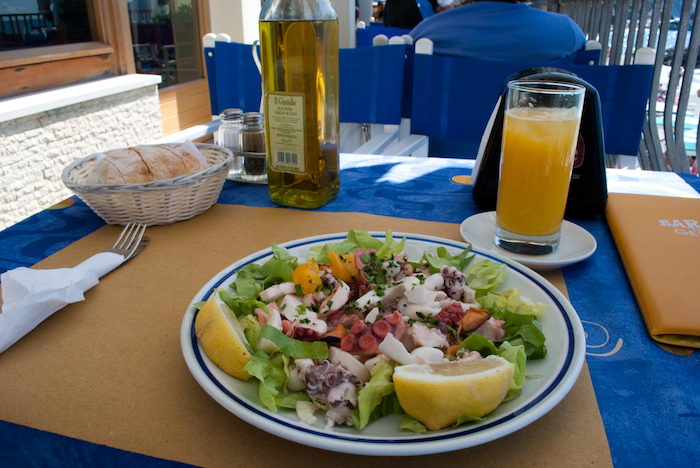
3. Don’t eat pizza wherever you go
Non mangiare la pizza ovunque
Avoid eating pizza at a fast food chain. Italy is the country of pizza and especially in its homeland, Naples, it is less expensive and the best you could ever try. Avoid eating pizza at a fast food chain.
Evita di mangiare la pizza in una catena di fast food. L’Italia è il Paese della pizza e soprattutto nella sua patria, Napoli, costa meno ed è la migliore che potreste mai provare.
Another tip: pizza is a southern Italian invention, so to taste a high quality recipe, that’s where you have to go. In the other regions of Italy, look for typical local products and traditional dishes to better savour the gastronomic heritage of each region.
Un altro consiglio: la pizza è un’arte del meridione d’Italia, per assaggiare la vera ricetta di qualità è lì che devi recarvi. Nelle altre regioni d’Italia cerca prodotti tipici locali e piatti della tradizione per assaporare al meglio il patrimonio gastronomico.
It should also not be forgotten that pineapple on pizza, especially in Naples, is seen as an act of abomination. It is better to avoid ordering it in part because, unless you are in a highly touristic place, it is not present on pizzeria menus.
Da non dimenticare inoltre che l’ananas sulla pizza, soprattutto a Napoli, è vista come un atto di abominio. Meglio evitare di ordinarla anche perché, a meno che tu non sia in un posto altamente turistico, nei menù delle pizzerie non è presente.
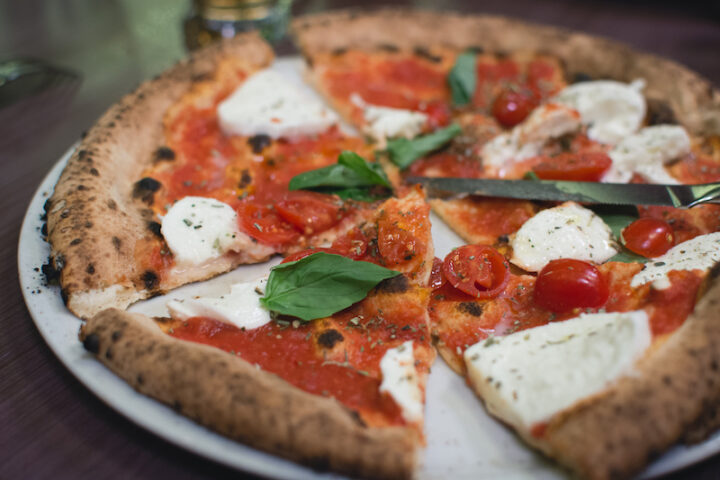
4. Avoid wearing an Italian football club shirt
Evita di indossare una maglia di un club calcistico italiano
The competition and rivalry between Italian football fans is quite evident. The passion for football is ingrained in Italians and some fans may not like the sight of a Juventus shirt while strolling through the center of Naples. For this reason, go ahead and wear Real Madrid or Manchester United shirts, but avoid Italian ones.
La competizione e la rivalità tra tifoserie calcistiche italiane è piuttosto evidente. La passione per il calcio è radicata negli italiani e alcuni tifosi potrebbero non gradire la visione di una maglia della Juventus mentre si passeggia per il centro di Napoli. Per questa ragione, indossa anche maglie del Real Madrid o del Manchester United, ma evita quelle italiane.

5. Don’t forget to book tickets to museums or attractions
Non dimenticare di prenotare le entrate a musei o attrazioni
Italy has the largest number of UNESCO World Heritage sites of historical, artistic, cultural and natural interest in the world. Entire cities, villages, mountains and localities are preserved so that they can survive the passage of time.
L’Italia possiede il maggior numero di siti di interesse storico, artistico, culturale e naturale dichiarati patrimonio mondiale dell’UNESCO nel mondo. Intere città, borghi, montagne e località sono preservate affinché possano sopravvivere al tempo.
Every visitor, even Italians themselves, visit a city or a region to admire the wonders that are hidden within it. Going to Rome and not seeing the Sistine Chapel is a bit like going to Florence and not seeing the Uffizi Galleries and Botticelli’s Venus.
Ogni visitatore, anche italiani stessi, visitano una città o una regione per ammirare le meraviglie che si celano al suo interno. Andare a Roma e non vedere la Cappella Sistina, è un po’ come andare a Firenze e non vedere le Gallerie degli Uffizi e la Venere di Botticelli.
Could you ever go to Naples and not see Pompeii or Herculaneum? Well, there are many who think this way and for this very reason, if you don’t buy tickets in advance, sometimes even weeks in advance, you could waste hours in line or in the worst case scenario, miss out on the opportunity to visit the archaeological site or museum.
Potresti mai andare a Napoli e non vedere Pompei o Ercolano? Ecco, sono in tanti a pensarla così e proprio per questo, se non si acquistano i biglietti in anticipo, talvolta anche settimane prima, potresti perdere ore in fila o nel peggiore dei casi, perdere la possibilità di visitare il sito archeologico o il museo.
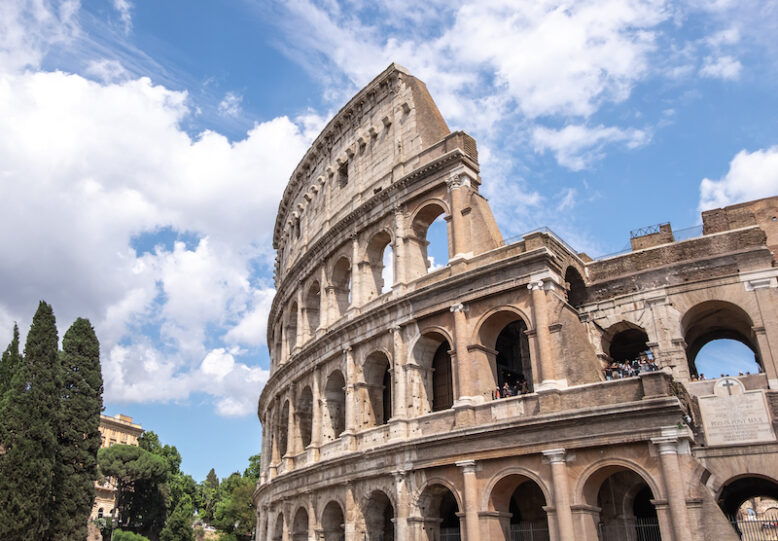
6. Forget your bags if you want to enjoy your holiday
Scordati le valigie se vuoi goderti la vacanza
Italy is characterised by ancient towns and villages, sometimes with origins dating well before the Middle Ages. This means that in many parts of the country there are numerous architectural barriers such as hillside villages, stairs and bridges – ask those who live in Venice! Carrying too many suitcases is always a huge mistake. Cut down as much as possible, and try to carry everything in backpacks, especially if you are travelling around certain cities or hilly and mountainous areas.
L’Italia è caratterizzata da città e borghi antichi, con origini talvolta ben precedenti al Medioevo. Questo comporta che in buona parte del Paese sono presenti un gran numero di barriere architettoniche come borghi in salita, scale e ponti – chiedetelo a chi vive a Venezia! Portare troppe valigie è sempre un errore madornale. Snelli il più possibile, cerca di portare tutto in zaini, soprattutto se il tuo viaggio è in città particolari o in zone collinari e montane.
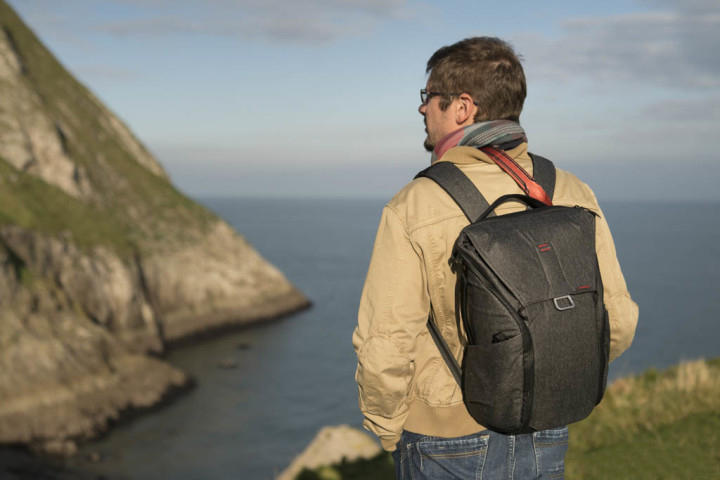
7. Don’t let street vendors fool you
Non lasciarti abbindolare dagli ambulanti
While visiting the main cities of Italy, you will be approached by street vendors of all kinds. Vendors or performers will try to give you products, experiences, or anything they can think of. But pay attention – although many street artists and people only want to display their creations, in other cases there could be some sort of hidden scam.
Visitando le principali città d’Italia sarete avvicinati da ambulanti di ogni genere. Venditori o performer cercheranno di regalarti prodotti, esperienze o qualsiasi cosa gli venga in mente. Presta attenzione, sebbene vi siano artisti di strada o persone che vogliano mostrare solo le loro creazioni, in altri casi potrebbe celarsi una qualche sorta di truffa.
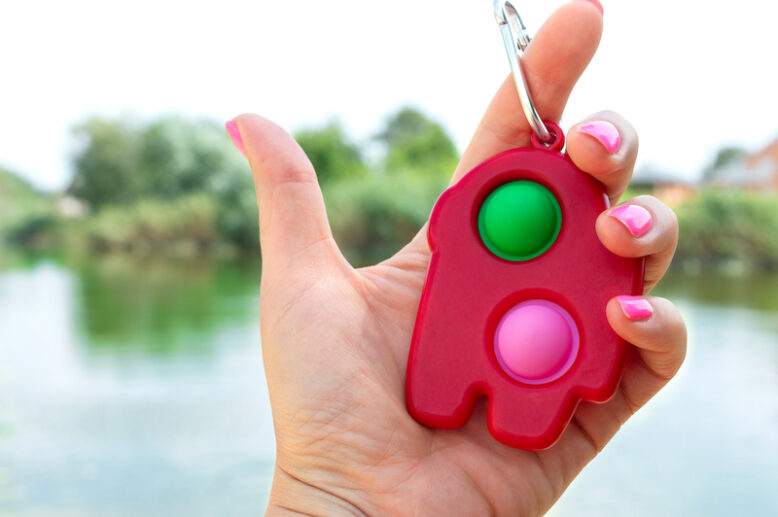
8. Cappuccino in Italy is for breakfast
Il cappuccino in Italia è per la colazione
Italians have some pretty strict rules about when and how certain things are done during the day. One of these concerns coffee and the cappuccino. If, on the one hand, coffee can be had in any bar for breakfast, after lunch, as an aperitif and after dinner, cappuccino is a separate matter.
Gli italiani hanno delle regole piuttosto rigide su quando e come si fanno determinate cose durante il giorno. Una di queste riguarda il caffè e il cappuccino. Se da un lato il caffè si prende in qualsiasi bar per colazione, post pranzo, aperitivo e post cena, il cappuccino è un discorso a parte.
The latter is actually considered as a breakfast drink. In fact, at any other time of the day, drinking it would seem strange and inappropriate. Therefore, during lunch or dinner, avoid asking for a cappuccino or caffe latte, and instead try a good glass of wine – red to accompany meat, white for fish-based dishes. If you can’t do without a cappuccino, have it as soon as you wake up, along with a delicious croissant from any café or pastry shop in the city.
Quest’ultimo infatti è considerato come una bevanda da colazione, infatti in qualsiasi altro momento della giornata sembrerebbe strano e inappropriato. Pertanto, durante il pranzo o la cena, evita di chiedere cappuccino o caffè latte, piuttosto prova un buon bicchiere di vino, rosso per accompagnare la carne, bianco per piatti a base di pesce. Se non puoi fare a meno del cappuccino, prendilo appena svegli, insieme ad un buon croissant disponibile in qualsiasi bar o pasticceria della città.
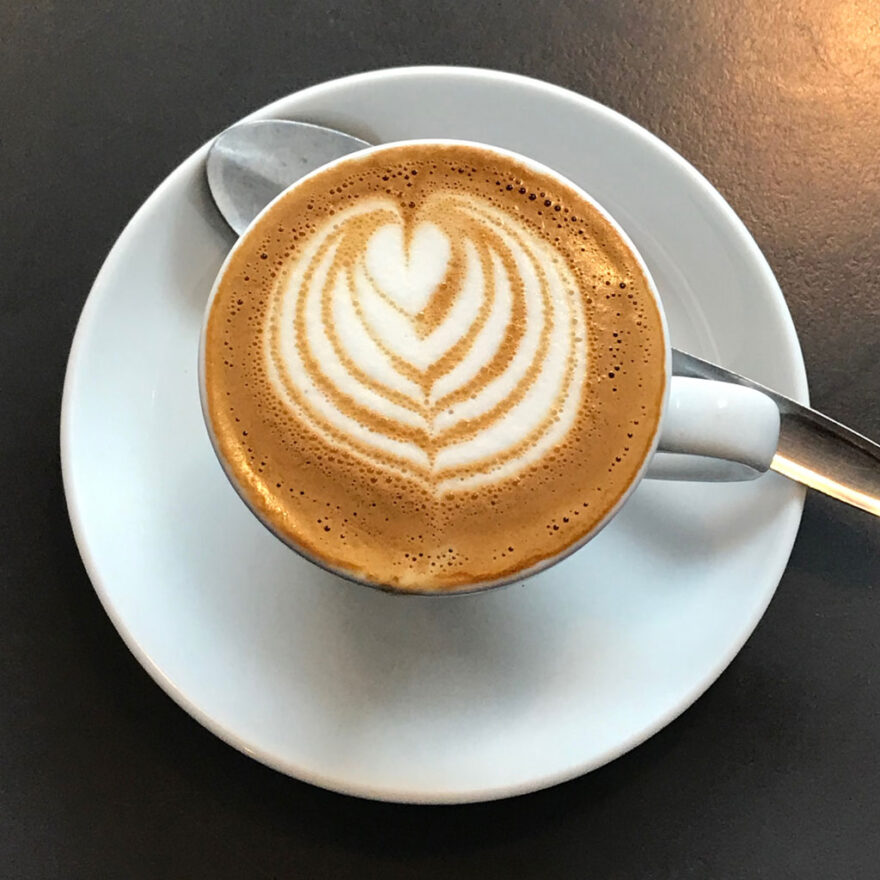
9. Don’t try to look for a savoury breakfast
Non tentare di cercare una colazione salata
Keep in mind that Italians do not like salty breakfasts in the morning and for this reason, it is impossible to find them around unless you stay overnight in a hotel or B&B which generally offer both sweet and savoury breakfasts. Avoid going in search of savoury breakfasts among the bars in the center, they don’t exist. Rather, try walking into a pastry shop to enjoy the delights of artisan sweets.
A meno che non si pernotti in un hotel che in genere offre sia colazione dolce che salata, tenete ben in mente che gli italiani al mattino non gradiscono la colazione salata e proprio per questa ragione, è impossibile trovarla in giro. Evita quindi di andare in cerca di colazioni salate tra i bar del centro, non esistono. Piuttosto, prova ad entrare in una pasticceria per godervi le delizie dei dolci artigianali.
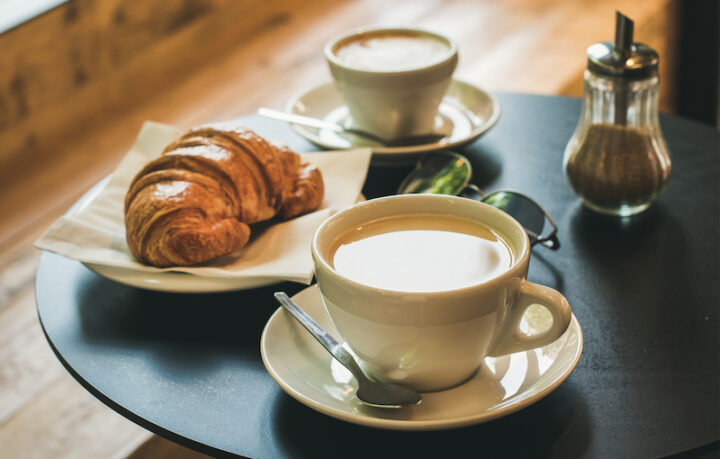
10. Don’t limit yourself to the city centre
Non visitare solo il centro città
The suburbs of cities and villages in Italy generally hide wonders that can only be admired by inquiring in advance. Just 10 or 15 minutes from the center it is possible to visit neighbouring areas with unique and unmissable attractions. Don’t linger too long in the historic center and try to explore far and wide, with due research and attention.
Le periferie di città e borghi in Italia in genere nascondono meraviglie che solo informandosi in anticipo è possibile ammirare. A soli 10 o 15 minuti dal centro è possibile visitare aree limitrofe con attrazioni uniche e imperdibili. Non stazionate troppo nel centro storico ed esplorate in lungo e in largo, con le dovute ricerche e attenzioni.
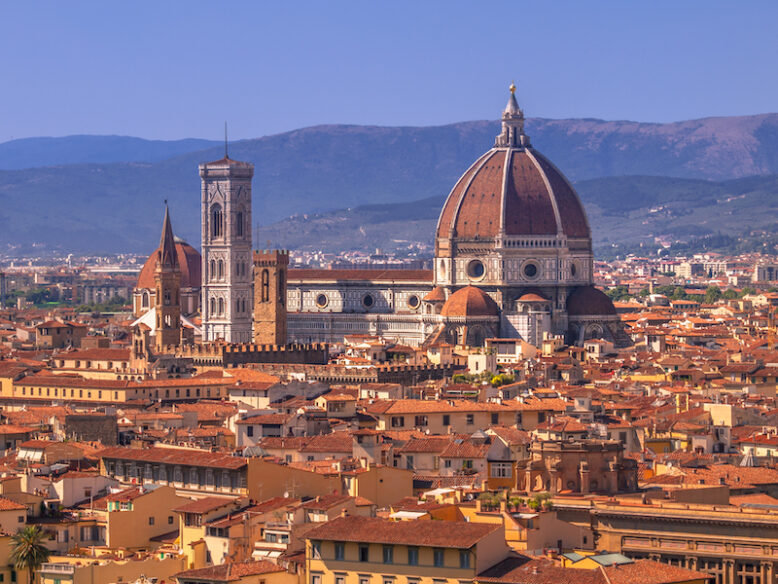

Fabio Guarino is a Linguist and Language Specialist who operates as a Freelance Content Writer and SEO Marketer. He considers himself fortunate to be able to blend his passion for his native language, Italian, along with English and Spanish, with his career.


